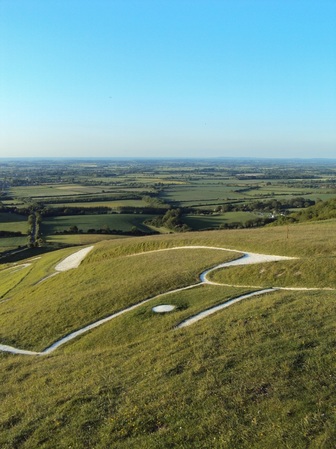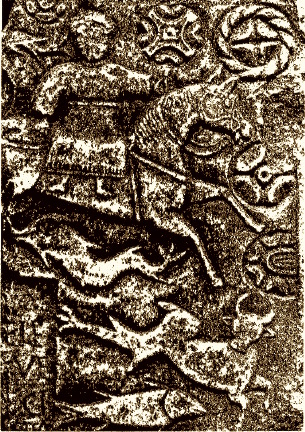Brython
Epona
Epona: 'Divine horse', is a goddess associated with horses. The centre of her worship was in Gaul, but devotional inscriptions and representations of her, in a number of different contexts, occur across Europe including at least one from Britain where it is likely she was also known as Rigantona.
Prayer for Epona-Rigantona
by Potia
Hail Epona Rigantona! Rigantona Epona Hail!
Epona of Horses, I praise you!
Rigantona of the Land, I praise you!
Epona of Sovereignty, I praise you!
Rigantona of Journeys, I praise you!
Epona of Stables, I praise you!
Rigantona of the Otherworld, I praise you!
Epona, Great Mother, I praise you!
Rigantona of the Singing Birds, I praise you!
Epona Rigantona, guide, guardian and teacher, I praise you!
Epona of Horses, I honour you!
Rigantona of the Land, I honour you!
Epona of Sovereignty, I honour you!
Rigantona of Journeys, I honour you!
Epona of Stables, I honour you!
Rigantona of the Otherworld, I honour you!
Epona, Great Mother, I honour you!
Rigantona of the Singing Birds, I honour you!
Epona Rigantona, guide, guardian and teacher, I honour you!
Epona of Horses, I thank you for your presence in my life.
Rigantona of the Land, I thank you for the stability in my life.
Epona of Sovereignty, I thank you for the choices you bring to my life.
Rigantona of Journeys, I thank you for your guidance through my life.
Epona of Stables, I thank you for the security in my life.
Rigantona of the Otherworld, I thank you for the mysteries in my life.
Epona, Great Mother, I thank you for your nurturing presence in my life.
Rigantona of the Singing Birds, I thank you for the beauty you bring to my life.
Epona Rigantona, guide, guardian and teacher, I thank you for being with me through my life.
Hail Epona Rigantona! Rigantona Epona Hail!
Epona of Horses, I praise you!
Rigantona of the Land, I praise you!
Epona of Sovereignty, I praise you!
Rigantona of Journeys, I praise you!
Epona of Stables, I praise you!
Rigantona of the Otherworld, I praise you!
Epona, Great Mother, I praise you!
Rigantona of the Singing Birds, I praise you!
Epona Rigantona, guide, guardian and teacher, I praise you!
Epona of Horses, I honour you!
Rigantona of the Land, I honour you!
Epona of Sovereignty, I honour you!
Rigantona of Journeys, I honour you!
Epona of Stables, I honour you!
Rigantona of the Otherworld, I honour you!
Epona, Great Mother, I honour you!
Rigantona of the Singing Birds, I honour you!
Epona Rigantona, guide, guardian and teacher, I honour you!
Epona of Horses, I thank you for your presence in my life.
Rigantona of the Land, I thank you for the stability in my life.
Epona of Sovereignty, I thank you for the choices you bring to my life.
Rigantona of Journeys, I thank you for your guidance through my life.
Epona of Stables, I thank you for the security in my life.
Rigantona of the Otherworld, I thank you for the mysteries in my life.
Epona, Great Mother, I thank you for your nurturing presence in my life.
Rigantona of the Singing Birds, I thank you for the beauty you bring to my life.
Epona Rigantona, guide, guardian and teacher, I thank you for being with me through my life.
Hail Epona Rigantona! Rigantona Epona Hail!
Eponalia : 18 December'XV Kalendas Ianuarius Eponae'
Fifteen days [before] the beginning of January - Epona's Day (a stone inscription from northern Italy) Earthlight glistens on the ivy leaf Sunlight falls on the holly bough The red fire stirs in the kindling We count three days to the longest night Three more till the glimmer of a longer day Then seven to the eve of New Year Calends These days we count from the feast of Epona First festival of the year's turning. |
Epona
by Heron
Epona (‘Divine Horse’) was principally worshipped in Gaul where it is known that roses were offered to her in stables. There are records of dedications to her across Europe, including, from Britain, a bronze statuette which features her sitting and holding a yoke to identify her connection with horses and also some ears of wheat which is the other common feature of her depiction. On either side of her are ponies, a mare on her left and a stallion on her right, each facing the wheatsheaf. Here her equine nature goes with her depiction as a goddess of fertility and plenty.
Depictions of her in stone, bronze and terracotta for the most part date from between the First and the Third centuries. We know she was one of the array of deities acknowledged in the Roman Empire with a feast day of 18th December assigned to her. Although the main area in which these depictions are found is in Gaul, they are also found as far south as Spain, eastwards across Germany and as far as south-east as Bulgaria as well as in Britain. The most common are those where she is mounted side-saddle and are mainly found in central and northern Gaul and in Germany. There is a sub-group among this type where she is accompanied by a foal found around the French town of Autun (Roman Augustodunum, Gaulish Bibracte) and also a few from this area where she sits astride rather than side-saddle. The other main aspect of her depiction is where she is shown with a horse on either side of her, either facing away from her (mainly along the Rhine) or towards her (examples from along the Danube, Italy, Spain and Britain).
In images of her on funeral stele she is shown leading the way into the Otherworld. Here she also functions as a psychopomp holding the key to the gateway to the lands of the dead.
Depictions of her in stone, bronze and terracotta for the most part date from between the First and the Third centuries. We know she was one of the array of deities acknowledged in the Roman Empire with a feast day of 18th December assigned to her. Although the main area in which these depictions are found is in Gaul, they are also found as far south as Spain, eastwards across Germany and as far as south-east as Bulgaria as well as in Britain. The most common are those where she is mounted side-saddle and are mainly found in central and northern Gaul and in Germany. There is a sub-group among this type where she is accompanied by a foal found around the French town of Autun (Roman Augustodunum, Gaulish Bibracte) and also a few from this area where she sits astride rather than side-saddle. The other main aspect of her depiction is where she is shown with a horse on either side of her, either facing away from her (mainly along the Rhine) or towards her (examples from along the Danube, Italy, Spain and Britain).
In images of her on funeral stele she is shown leading the way into the Otherworld. Here she also functions as a psychopomp holding the key to the gateway to the lands of the dead.
|
Resources:
C. M Johns British Museum Quarterly 36 (1971) Katheryn M Linduff ‘EPONA : A Celt Among the Romans’ Latomus 38 (1979) Apuleius The Golden Ass Trans. Robert Graves (Penguin, 1950) p.92 Laura S Oaks ‘Epona’ in Pagan Gods and Shrines of the Roman Empire ed. M Henning & A King (1986) Miranda Green Celtic Goddesses British Museum p. 185 (1995) |
Proudly powered by Weebly


